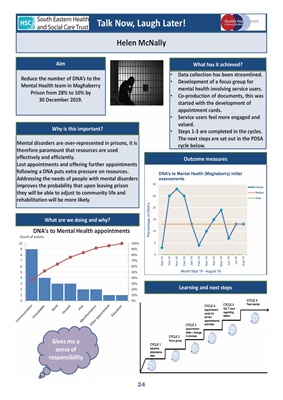
Talk Now, Laugh Later!
Helen McNally
Mental disorders are over-represented in prisons, it is
therefore paramount that resources are used
effectively and efficiently.
Lost appointments and offering further appointments
following a DNA puts extra pressure on resources.
Addressing the needs of people with mental disorders
improves the probability that upon leaving prison
they will be able to adjust to community life and
rehabilitation will be more likely. Measures
Why did you choose those measures?
PLEASE INSERT YOUR LATEST DATA
Why is this important?
Outcome measures
Learning and next steps
Aim
Reduce the number of DNA's to the
Mental Health team in Maghaberry
Prison from 28% to 10% by
30 December 2019.
• Data collection has been streamlined.
• Development of a focus group for
mental health involving service users.
• Co-production of documents, this was
started with the development of
appointment cards.
• Service users feel more engaged and
valued.
• Steps 1-3 are completed in the cycles.
The next steps are set out in the PDSA
cycle below.
What has it achieved?
What are we doing and why?
INSERT
Team
photo
Insert Trust Logo
0
5
10
15
20
25
30
Sep-18
Oct-18
Nov-18
Dec-18
Jan-19
Feb-19
Mar-19
Apr-19
May-19
Jun-19
Jul-19
Aug-19
DNA's to Mental Health (Maghaberry) initial
assessments
Values
Median
Goal
Month Sept 18 - August 19
Percentage of DNA's
0%200%Count of events
Gives me a
sense of
responsibility
0%
10%
20%
30%
40%
50%
60%
70%
80%
90%
100%
0
1
2
3
4
5
6
7
8
9
10
DNA's to Mental Health appointments
Count of events
24